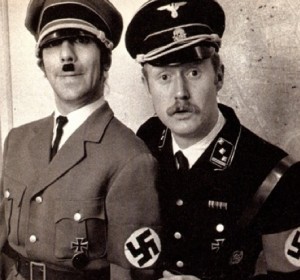Hey, the corporate suits who developed the network named it MTV, as in MUSIC television, not RTV, as in ROCK television. It was Michael Jackson who finally broke MTV’s color barrier when the station began airing his “Billie Jean” video on a regular basis in 1983. Interestingly, MTV aired Blondie’s 1980 rap-styled song “Rapture” soon after the network’s debut on August 1, 1981, but they wouldn’t feature any black hip-hop artists until the mid-80s.
It took MTV Europe to get the ball rolling. In 1987 they launched Yo! MTV Raps, a show that was developed for U.S. television a year later. It ran from August 1988 to August 1995. As much as I’d like to think that Mr. Bowie’s criticism helped bring about change, we all know that money is the driving force behind all decisions made in corporate America. The execs at MTV simply realized they could turn rap into revenue by pulling in a whole new segment of viewers.
© Dana Spiardi, January 12, 2016
]]>Some critics panned his depiction of the pop artist; Examiner art critic David Bonetti wrote, “[the film’s] most notable failure is David Bowie’s Warhol.” But many who knew the pop artist intimately hailed Bowie’s interpretative work. Paul Morrissey, who directed many of Warhol’s films, said, “You come away from Basquiat thinking Andy was comical and amusing, not a pretentious, phony piece of shit, which is how [other actors] show him.” Bob Colacello, who edited Warhol’s Interview magazine in the 70s and early 80s, also compared various actors’ portrayals, saying, “[Crispin] Glover walked the most like [the real] Andy, [Jared] Harris talked the most like Andy, and Bowie looked the most like Andy. When I first saw Bowie on the set, it was like Andy had been resurrected.” (The Andy Warhol Museum in Pittsburgh loaned Andy’s actual wig, glasses and jacket to Bowie to wear during filming.)
Bowie must have relished that film role. His fascination with the pop art provocateur began at an early age — back when he was David Jones, growing up in South London. In 1971, the Man Who Would Be Ziggy wrote a rather abstruse song, “Andy Warhol,” in tribute to the artist.
Andy Warhol looks a scream
Hang him on my wall
Andy Warhol, Silver Screen
Can’t tell them apart at all
He dreamed of one day performing the tune live for Andy, and was about to get his chance in September 1971 when he and his former wife Angie came to New York to sign a record deal with RCA. His tour manager Tony Zanetta took him to Warhol’s “Factory” and introduced the two unconventional characters to one another. In a January 11, 2016, column for the online magazine Bedford+Bowery, Zanetta recalled the encounter:
“The meeting was kind of tense because Warhol was not a great talker, you had to talk and entertain Andy, and David really wasn’t a great talker either. Nobody was really taking this conversation and running with it. So they were circling each other and then David gave him a copy of “Hunky Dory,” on which was his ode to Andy Warhol, the song ‘Andy Warhol.’ We probably played it, I can’t remember. Warhol didn’t say anything but absolutely hated it. Which didn’t help the meeting. Remember, David Bowie was not a big star. He was just some guy off the street as far as Andy Warhol was concerned. They found a common ground in David’s shoes. David was wearing yellow Mary Janes and Andy had been a shoe illustrator, which David knew so they began talking about shoes. Otherwise it was not the greatest meeting [laughs].”
Writer Glenn O’Brien offered his own recollection of the encounter in a January 11, 2016, column for Out. He describes a long-haired Bowie in baggy trousers and a floppy hat performing a strange pantomime before presenting his ode to Andy (some who were present that day said he sang the song, others claim he played the record instead).
O’Brien wrote, “I don’t think Andy could tell whether it was an homage or a send-up, with its rather ambiguous lyrics, but everyone was very nice and polite…I don’t know what Andy thought of that day — probably not much, but he had that sense of judging a person’s self-esteem, and I think Bowie passed on that count.”
Bowie’s obituary in The Telegraph recounted the mood following his performance: “Warhol was upset by the lines: He’ll think about paint and he’ll think about glue / What a jolly boring thing to do – and left the room, returning only to kneel and take a photograph of Bowie’s yellow shoes. Bowie never again penetrated the inner circle.”
True. Unlike his contemporaries Lou Reed and Mick Jagger, the Thin White Duke would never end up sharing intimate conversations with Andy at Max’s Kansas City or Studio 54. (I couldn’t even find a photo of Andy and David together, and you know how much Andy liked being photographed with the rich and famous.) Anyway, Warhol no doubt came to appreciate Bowie’s brilliance through the years. And there’s no denying Bowie’s adoration for the painter. When Basquiat writer-director Julian Schnabel (himself a painter) chose the singer to play the part of Warhol in the film, he was understandably thrilled.
Here are some scenes of Bowie as Andy. Enjoy!
This clip features Bowie, along with Jeffrey Wright as Basquiat, Dennis Hopper as art dealer Bruno Bischofberger, and the wonderfully quirky Benicio del Toro as Basquiat’s friend Benny.
The first scene of this clip features all the main characters, plus Parker Posey as gallery owner Mary Boone (sitting next to Basquiat) and Michael Wincott as party-crashing art dealer Rene Ricard. In the second scene we see how Andy created his famous oxidation paintings, also known as “piss paintings.” The clip ends with a scene of a disillusioned Basquiat, spending an afternoon in New York with his mentor, Andy.
Here’s a look at a Basquiat/Warhol collaborative session. You can see many of their joint projects on display at the fabulous Andy Warhol Museum in Pittsburgh.
Finally, here’s some rare film footage of David Bowie taken during his visit to Warhol’s factory in 1971. His pantomime performance is cut to the song “Andy Warhol” from the “Hunky Dory” LP.
© Dana Spiardi, Jan 11, 2016
The title of this article was inspired by my friend George Heidekat.
]]>
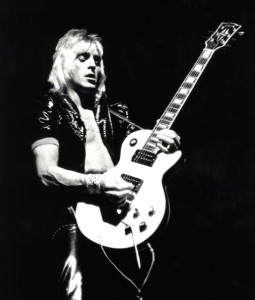 Mick was an arranger, producer, songwriter and classically-trained multi-instrumentalist who became the most recognized super guitarist of the glam rock era. Born on May 26, 1946, in northern England, he had kicked around in a number of bands for a time and was working as a city parks department gardener when he was recruited to play with Bowie on a BBC Radio 1 show in 1970. He went on to make his mark as the lead guitarist, arranger and overall driving musical force on the burgeoning superstar’s early groundbreaking albums: “The Man Who Sold the World,” “Hunky Dory,” “The Rise and Fall of Ziggy Stardust and the Spiders from Mars,” “Aladdin Sane,” and “Pin Ups.”
Mick was an arranger, producer, songwriter and classically-trained multi-instrumentalist who became the most recognized super guitarist of the glam rock era. Born on May 26, 1946, in northern England, he had kicked around in a number of bands for a time and was working as a city parks department gardener when he was recruited to play with Bowie on a BBC Radio 1 show in 1970. He went on to make his mark as the lead guitarist, arranger and overall driving musical force on the burgeoning superstar’s early groundbreaking albums: “The Man Who Sold the World,” “Hunky Dory,” “The Rise and Fall of Ziggy Stardust and the Spiders from Mars,” “Aladdin Sane,” and “Pin Ups.”
But playing in Bowie’s Spiders from Mars band required more than just musical talent. It also demanded space-alien style and a touch of daring. And it didn’t take long before the androgynous, flame-tressed “Ziggy” transformed his fair-haired guitarist into a glamorous arachnid. A performance of Bowie and his band on the BBC’s Top of the Pops in July 1972 shows the wispy singer lovingly placing his hands on Mick’s shoulders and arms while the two perform “Starman.” This was a bold move on a televised show, given the suspicious nature of the two men’s gender.
But what did Bowie care? A short time earlier he had announced his bisexuality to the U.K. music press. He would take the homo-erotica theme to a new level when he began simulating fellatio on Mick’s guitar during on-stage performances. The hetero, Mormon-raised guitarist played along like the good sport he was. His sister Maggi once told The Guardian that back home in the Yorkshire town of Hull she had to endure jeers of “Your brother’s a poof.”
“He was very much a salt-of-the-earth type, the blunt northerner with a defiantly masculine personality, so that what you got was the old-fashioned Yin and Yang thing,” Bowie said of his guitarist in 1994. “As a rock duo, I thought we were every bit as good as Mick and Keith or Axl and Slash. Ziggy and Mick were the personification of that rock n roll dualism.”
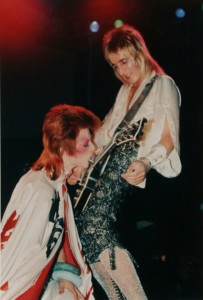 But Mr. Bowie never lingers on one planet very long, and in 1973 he parted ways with the most vital musical partner of his career. By the time of the breakup, Mick already had several independent projects under his belt; he had co-produced Lou Reed’s famous “Transformer” album in 1972, and arranged string ensembles for Pure Prairie League’s “Bustin’ Out” LP that same year. But making an impact sans a charismatic frontman proved challenging. Between 1973 and 1975 he released two unsuccessful solo albums and formed the short-lived Hunter-Ronson Band with former Mott the Hooper leader Ian Hunter. The work drew little fanfare.
But Mr. Bowie never lingers on one planet very long, and in 1973 he parted ways with the most vital musical partner of his career. By the time of the breakup, Mick already had several independent projects under his belt; he had co-produced Lou Reed’s famous “Transformer” album in 1972, and arranged string ensembles for Pure Prairie League’s “Bustin’ Out” LP that same year. But making an impact sans a charismatic frontman proved challenging. Between 1973 and 1975 he released two unsuccessful solo albums and formed the short-lived Hunter-Ronson Band with former Mott the Hooper leader Ian Hunter. The work drew little fanfare.
“The one thing that saved Mick at this point was Dylan,” Mick Ronson’s wife Suzi told Uncut magazine’s Garry Mulholland in 2013. She was referring to Mick’s invitation to join Bob Dylan’s Rolling Thunder Review, a tour featuring a roaming band of minstrel rockers that included Joan Baez, Joni Mitchell, Ramblin’ Jack Elliott, and Kinky Friedman. “That whole tour was this huge, huge adventure. A real treasure hunt,” Mick told Mulholland in 1976. “There was Joan Baez. McGuinn. Ginsberg – he’s a grand lad, is Allen. There was Dylan. And there I was, too. For a lad from Yorkshire like meself, it were truly out of this world.”
The Yorkshire lad went on to work as a producer, arranger and guitarist for Morrissey, Van Morrison, Roger McGuinn, T-Bone Burnett, John Mellencamp and many other artists. He stayed active right up till his death from liver cancer at age 46 on April 29, 1993.
David Bowie ushered in a whole new brand of performance art with his space-age song themes and colorful alter egos. And Mick Ronson took the spectacle to a whole new level with his rock-solid musicianship.
This Top of the Pops performance shows the very chummy nature of Ziggy and his spider.
Here’s Mick performing a guitar solo during a Bowie show.
©Dana Spiardi, May 26, 2015
]]>
 David Jones had been kicking around London’s music scene since the early 1960s with limited success. In 1967 he changed his name to David Bowie and began experimenting like mad with various weird personae and musical styles. He was poised to become one of the most creative, mercurial, and artfully attired performers in history.
David Jones had been kicking around London’s music scene since the early 1960s with limited success. In 1967 he changed his name to David Bowie and began experimenting like mad with various weird personae and musical styles. He was poised to become one of the most creative, mercurial, and artfully attired performers in history.
As the decade came to a close, earthlings everywhere were buzzing about the impending moon walk. And Bowie had the moxie to capitalize on it. On June 20, 1969, he recorded an ethereal tune called “Space Oddity.” The title is a takeoff on Stanley Kubrick’s 1968 sci-fi flick 2001: A Space Odyssey. The song concerns a lone astronaut named Major Tom, who loses contact with Ground Control after departing his capsule to float in space. Many believe the song was an attempt to mock the U.K.’s failed space program. Some think it’s a metaphor for LSD tripping.
Bowie released the single on July 11, intending BBC radio to debut it on the day of the moon landing. “The Beeb,” as it’s affectionately called, decided not to air it until the Apollo crew had safely returned to earth. The song reached #5 on the U.K. charts and was awarded the country’s prestigious Ivor Novello award that year, but it made little impact in the U.S., charting at #124. (Its re-release in the U.S. in 1973 garnered the artist his first American hit.)
“Space Oddity” was the first in a series of records inspired by Bowie’s fascination with otherworldly themes and alien beings. The 1972 concept album “The Rise and Fall of Ziggy Stardust and the Spiders from Mars” introduced an extraterrestrial rock star who comes to earth to deliver a message of hope as the planet slowly dies. The LP included spacey songs like “Moonage Daydream,” “Starman,” and “Lady Stardust.”
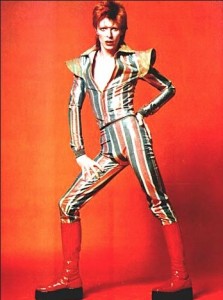 Future LPs featured other curious characters: Aladdin Sane (a lad insane), Halloween Jack, Lady Grinning Soul, and The Jean Genie (he says he’s a beautician / and sells you nutrition / and keeps all your dead hair for making up underwear). Bowie’s keen interest in George Orwell’s novel of a post-apocalyptic world inspired songs like “1984” and “Big Brother.” In 1976 he played the lead character in the film The Man Who Fell to Earth, about a humanoid alien sent to earth to bring water back to his drought-stricken planet. No rock star before or since has so comfortably worn the mantle of the outrageous alien as David Bowie. So, is it any wonder his only son would grow up with the same love of all things cosmic?
Future LPs featured other curious characters: Aladdin Sane (a lad insane), Halloween Jack, Lady Grinning Soul, and The Jean Genie (he says he’s a beautician / and sells you nutrition / and keeps all your dead hair for making up underwear). Bowie’s keen interest in George Orwell’s novel of a post-apocalyptic world inspired songs like “1984” and “Big Brother.” In 1976 he played the lead character in the film The Man Who Fell to Earth, about a humanoid alien sent to earth to bring water back to his drought-stricken planet. No rock star before or since has so comfortably worn the mantle of the outrageous alien as David Bowie. So, is it any wonder his only son would grow up with the same love of all things cosmic?
Duncan Zowie Haywood Jones, born in 1971, is the offspring of David and his then-wife, American model Angela Barnett. His folks called him Zowie until he was old enough to desire a human name. Thus, he transitioned to Joey, then Joe, and finally to Duncan, at around age 18.
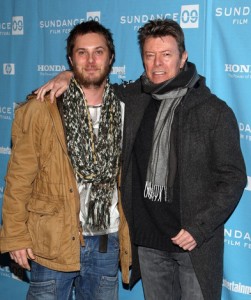
He earned a bachelor’s degree in philosophy from The College of Wooster and later attended London Film School, graduating as a director. At age 38 he made his first film, 2009’s Moon. It’s the story of an astronaut named Sam Bell (played by the fabulous Sam Rockwell) who’s nearing the end of a lonely three-year stint on the moon base Sarang. He works alone with only a computer named GERTY to assist him as he harvests Helium-3 and rockets it to an energy-starved Earth. As his contract draws to a close and retirement looms, he begins to experience hallucinations. He soon discovers a new, identical Sam. Is he a replacement? Is his employer, the conglomerate LUNAR, churning out clones to keep the operation running? Well, yes. Most companies do this, we just aren’t aware of it.
The film was a critical and commercial success, generating over $9 million worldwide. The British Academy of Film and Television Arts (BAFTA) presented Duncan Jones with the award for Outstanding Debut by a British Writer, Director or Producer. The movie won the award for Best British Independent Film, and garnered the Hugo Award for Best Dramatic Presentation, Long Form, beating out blockbusters like Avatar and District 9. Jones is reportedly planning a sequel to Moon, and may possibly produce a trilogy of films set in the same fictional universe.
So, it appears that producing brilliant outer space fantasies is a bit of a family business. (Now, if Duncan could only look as smashing in a Kansai Yamamoto vinyl bodysuit as Daddy). The Gods of the Cosmos have been very, very good to the Bowie family.
Here’s the original 1969 video of the song that launched Bowie into outer space:
© Dana Spiardi, July 20, 2014
]]>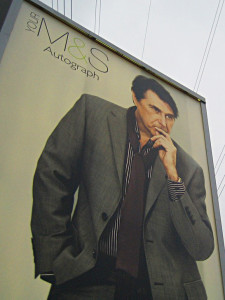 The innately-suave Bryan Ferry, leader of the popular U.K. band Roxy Music, used to refer to his West London recording studio as “The Führerbunker,” which was the name of Hitler’s Berlin bunker. He once told German newspaper Welt am Sonntag: “The Nazis knew how to put themselves in the limelight and present themselves. The way in which the Nazis stage-managed and presented themselves, my gentleman! I’m talking about Leni Riefenstahl films and Albert Speer’s buildings and the mass rallies and the flags – simply fantastic.” At the time of the interview, Ferry had been contracted by British retailer Marks and Spencer (founded by Russian Jewish refugee Michael Marks) to model its “Autograph” menswear line. England’s Jewish community was appalled by his comments and demanded the House of Commons make a motion urging people to boycott M&S and refuse to buy Ferry’s albums. He responded with a statement: “I apologize unreservedly for any offense caused by my comments on Nazi iconography, which were solely made from an art history perspective. I, like every right-minded individual, find the Nazi regime, and all it stood for, evil and abhorrent.” Despite his mea culpa, Marks and Spencer cut all ties with him. That’s some heavy karma for a fashionista like Bryan.
The innately-suave Bryan Ferry, leader of the popular U.K. band Roxy Music, used to refer to his West London recording studio as “The Führerbunker,” which was the name of Hitler’s Berlin bunker. He once told German newspaper Welt am Sonntag: “The Nazis knew how to put themselves in the limelight and present themselves. The way in which the Nazis stage-managed and presented themselves, my gentleman! I’m talking about Leni Riefenstahl films and Albert Speer’s buildings and the mass rallies and the flags – simply fantastic.” At the time of the interview, Ferry had been contracted by British retailer Marks and Spencer (founded by Russian Jewish refugee Michael Marks) to model its “Autograph” menswear line. England’s Jewish community was appalled by his comments and demanded the House of Commons make a motion urging people to boycott M&S and refuse to buy Ferry’s albums. He responded with a statement: “I apologize unreservedly for any offense caused by my comments on Nazi iconography, which were solely made from an art history perspective. I, like every right-minded individual, find the Nazi regime, and all it stood for, evil and abhorrent.” Despite his mea culpa, Marks and Spencer cut all ties with him. That’s some heavy karma for a fashionista like Bryan.
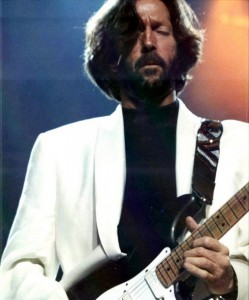 While guitar virtuoso Eric Clapton never extolled the tenets of Nazism per se, he’s certainly expressed some very fascist views. In a drunken rant during a concert in Birmingham, England, in August 1976, he voiced his support of Britain’s conservative minister Enoch Powell, who had denounced the country’s anti-discrimination legislation and liberal immigration policy. Clapton told the audience: “Stop Britain from becoming a black colony. Get the foreigners out. Get the wogs out. Get the coons out. Keep Britain white. I used to be into dope, now I’m into racism. It’s much heavier, man. F..king wogs, man. F..king Saudis taking over London. Bastard wogs. Britain is becoming overcrowded and Enoch will stop it and send them all back.” Booze notwithstanding, what motivates a seemingly normal person to lash out like this? Admittedly, England was a mess in the ’70s. It’s a fascist’s nature to seek scapegoats during times of trouble. Clapton clearly took a lesson from their book, and vented his wrath on the immigrants.
While guitar virtuoso Eric Clapton never extolled the tenets of Nazism per se, he’s certainly expressed some very fascist views. In a drunken rant during a concert in Birmingham, England, in August 1976, he voiced his support of Britain’s conservative minister Enoch Powell, who had denounced the country’s anti-discrimination legislation and liberal immigration policy. Clapton told the audience: “Stop Britain from becoming a black colony. Get the foreigners out. Get the wogs out. Get the coons out. Keep Britain white. I used to be into dope, now I’m into racism. It’s much heavier, man. F..king wogs, man. F..king Saudis taking over London. Bastard wogs. Britain is becoming overcrowded and Enoch will stop it and send them all back.” Booze notwithstanding, what motivates a seemingly normal person to lash out like this? Admittedly, England was a mess in the ’70s. It’s a fascist’s nature to seek scapegoats during times of trouble. Clapton clearly took a lesson from their book, and vented his wrath on the immigrants.
His outrageous diatribe helped mobilize the creation of Rock Against Racism (today known as Love Music Hate Racism), an organization spearheaded by British photographer Red Saunders, Roger Huddle and members of Kartoon Klowns. Clapton later apologized, saying his remarks were meant as a joke, and that he was ignorant of politics at that time. Yet, in 2007, he told a reporter that he is still a fan of Enoch Powell, whom he does not consider a racist.
And finally, there’s The Thin White Duke, David Bowie, who may have taken the “white” thing a bit too far. In April 1976, he was traveling by rail when customs officials at the Poland/Russia border held up the train for several hours while they seized his collection of Nazi books and memorabilia. Bowie claimed he was using the material as research for a possible film project about Nazi PR meister Joseph Goebbels. A worthy try on his part, but it’s hard to believe that claim after reading his comments in the press decades ago. In an interview conducted by Cameron Crowe for the September 1976 issue of Playboy, Bowie declared, “Britain is ready for a fascist leader…After all, fascism is really nationalism.” He went on to say, “Adolf Hitler was one of the first rock stars” and “You’ve got to have an extreme right front come up and sweep everything off its feet and tidy everything up.” To quote a Bowie song, this bordered on rock and roll suicide.
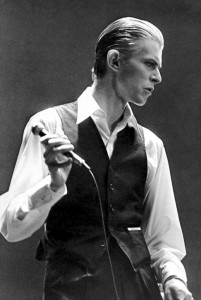
I was, and still am, a huge Bowie fan, and only recently learned of his dabbling in fascism. Of course, he eventually apologized for his statements, blaming his outlandish behavior on his preoccupation with the occult, excessive cocaine use, and his fascination with German philosopher Friedrich Nietzsche, who coined the term Übermensch (super-man) – a word used by Hitler to describe his Aryan master race. (Nietzsche himself was not anti-Semitic and deplored German nationalism.) Bowie told an interviewer, “I have made my two or three glib, theatrical observations on English society and the only thing I can now counter with is to state that I am NOT a fascist.”
So, what are we to make of these rockers and their interest in Third Reich nostalgia? A number of my close family members are Jewish. Should I feel a sense of guilt about admiring some of the performers cited in this article — many of whom have long inspired me with their music and fashion? I want to believe these people were merely acting up (often with the aid of chemicals), experimenting with shocking, subversive personae, and flipping the finger to mainstream society – as most rockers are destined to do. I admit I’m conflicted.
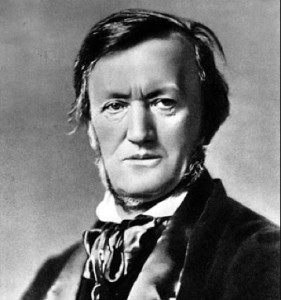 A hundred years before the birth of rock and roll, German composer Richard Wagner was all the rage in Europe, with his soaring, richly orchestrated operas. He was an anti-Semite, harshly critical of Jewish artistic contributions to German culture. Many years later Adolph Hitler would embrace Wagner’s music as the perfect soundtrack to his nationalist movement. Woody Allen once joked, “I just can’t listen to any more Wagner, you know…I’m starting to get the urge to conquer Poland.” His music was extremely controversial among Jews and was completely banned in Israel for many years. However, in recent decades many Jews have come to recognize that it’s possible to distinguish between the racist nature of Richard Wagner and the beauty of his creation. In 1981, Zubin Mehta performed parts of Wagner’s Tristan und Isolde as an encore at a concert in Tel Aviv. Many audience members walked out, but most stayed till the end. In 2000, Holocaust survivor Mendi Rodan conducted Wagner’s Siegfried Idyll, and in August 2001 Daniel Barenboim conducted a concert in Tel Aviv that included an excerpt form Tristan und Isolde. While Wagner’s music still incites controversy in Israel, his works are broadcast on government-owned radio and television stations.
A hundred years before the birth of rock and roll, German composer Richard Wagner was all the rage in Europe, with his soaring, richly orchestrated operas. He was an anti-Semite, harshly critical of Jewish artistic contributions to German culture. Many years later Adolph Hitler would embrace Wagner’s music as the perfect soundtrack to his nationalist movement. Woody Allen once joked, “I just can’t listen to any more Wagner, you know…I’m starting to get the urge to conquer Poland.” His music was extremely controversial among Jews and was completely banned in Israel for many years. However, in recent decades many Jews have come to recognize that it’s possible to distinguish between the racist nature of Richard Wagner and the beauty of his creation. In 1981, Zubin Mehta performed parts of Wagner’s Tristan und Isolde as an encore at a concert in Tel Aviv. Many audience members walked out, but most stayed till the end. In 2000, Holocaust survivor Mendi Rodan conducted Wagner’s Siegfried Idyll, and in August 2001 Daniel Barenboim conducted a concert in Tel Aviv that included an excerpt form Tristan und Isolde. While Wagner’s music still incites controversy in Israel, his works are broadcast on government-owned radio and television stations.
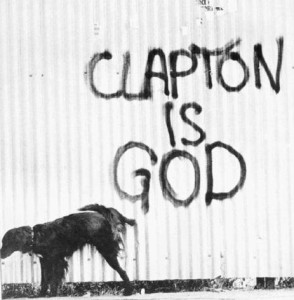 A very liberal friend of mine once trashed all of her Van Morrison CDs when it was rumored he planned to perform at George Bush’s 2001 inauguration (he didn’t). Should I, a staunch proponent of civil liberties, burn my beloved collection of Bowie and Clapton LPs because I loathe the views they expressed three decades ago? No. Because, despite what many artists would like to believe, they’re imperfect humans like everybody else — not “gods,” as the Clapton graffiti adorning a London train station once declared.
A very liberal friend of mine once trashed all of her Van Morrison CDs when it was rumored he planned to perform at George Bush’s 2001 inauguration (he didn’t). Should I, a staunch proponent of civil liberties, burn my beloved collection of Bowie and Clapton LPs because I loathe the views they expressed three decades ago? No. Because, despite what many artists would like to believe, they’re imperfect humans like everybody else — not “gods,” as the Clapton graffiti adorning a London train station once declared.
When it comes to accepting or banishing British rockers for their fascination with Nazi imagery and ideology, I leave it to you to come to your own conclusions.
© Dana Spiardi, Aug 26, 2013
Related: What’s with Brit Rockers and the Third Reich – Part 1
]]>
